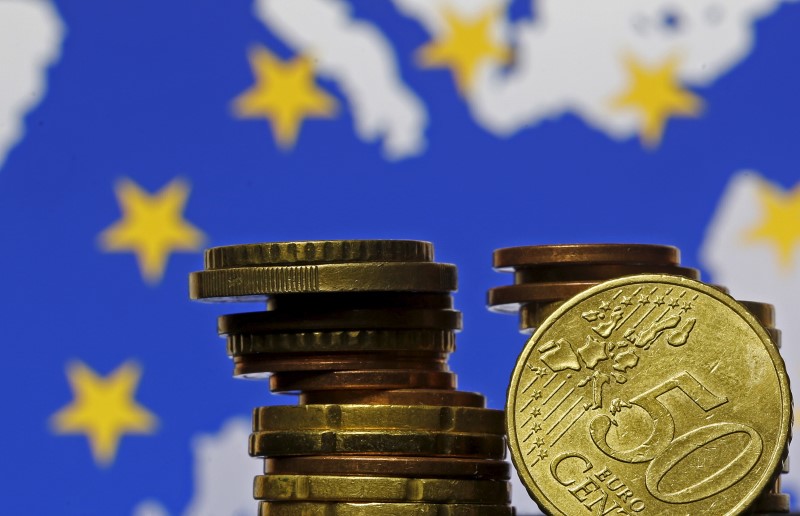By Noah Barkin
BERLIN (Reuters) - The euro zone crisis is back - at least in the minds of many Germans.
Since last summer, the influx of hundreds of thousands of refugees from the war-torn Middle East has overshadowed all else, dominating the political debate in Berlin and the front pages of German newspapers.
But over the past weeks a shift has taken place. With the tide of arriving migrants slowing to a trickle, angst over Europe's long-suffering currency bloc has returned - with a vengeance.
"A storm is brewing," warned an editorial in the left-leaning daily Sueddeutsche Zeitung this week.
"Sometimes the fate of a people is decided in moments where there is not so much drama. That is what is happening now with Europe's currency union."
The renewed focus on the euro zone is tied to a series of distinct yet interconnected developments that have deepened the sense of anxiety in Germany's political and media establishment.
These include the shift away from austerity in southern Europe, the loose money polices of the European Central Bank and recent changes in the German political landscape.
One month ago, the Alternative for Germany (AfD), a right-wing populist party that had railed against Chancellor Angela Merkel's open-door refugee policies, surged into three state parliaments, stunning the established parties and forcing them into a strategic rethink.
Merkel's conservatives emerged from this discussion convinced that they must do everything in their power to shift the domestic debate away from refugees, officials told Reuters.
Since then, party leaders, led by Finance Minister Wolfgang Schaeuble, have stepped up their verbal attacks on the ECB's low interest rate policies.
Their fear is that the AfD, founded three years ago as an anti-euro party, could seize on this theme too in the run-up to the next federal election in 2017.
One senior coalition leader described the rates debate as "the next big theme for the AfD".
Low rates are an especially sensitive topic in Germany because they are seen as eroding the savings of millions of people who have squirreled away cash in banks for their retirement. The AfD was quick to jump on ECB President Mario Draghi's comment last month that "helicopter money" - whereby a central bank hands cash directly to euro zone citizens to bolster inflation - was a "very interesting" concept.
"It is an opportune time to complain about the ECB right now," a senior official close to Merkel acknowledged this week.
REFORM FATIGUE
The ECB is also coming under fire for another reason: the sense in Germany that its loose policies have diminished the pressure on southern European countries to reform their economies and reduce still-swollen debt piles and deficits.
Berlin has watched on in horror this year as one euro zone country after another has signalled a departure from the consolidation path that Merkel and Schaeuble insisted upon at the height of the euro crisis.
In Portugal, a new Socialist government backed by far-left allies in parliament announced plans last month to lift the minimum wage by 20 percent, cut value-added tax for restaurants by a whopping 10 percentage points and reintroduce four public holidays.
Further afield, attempts by the French government to reform the labour market have stalled in the face of protests. And both Italy and Spain have signalled that they have little interest in listening to the European Union about lowering their deficits.
Meanwhile, German frustration with Greece is bubbling over again as reform talks between Athens and its creditors drag on. This week the normally reserved German head of the euro zone's rescue fund, Klaus Regling, complained that Greek reform implementation was the worst in all of Europe.
German newspapers have been full of charts showing rising debt levels across the euro zone's southern periphery.
Germany and its euro zone partners still hold sway over Greece, which needs funds from its third bailout to pay its bills and avoid bankruptcy.
But Berlin is realising that its influence in other countries, which never received a bailout in the first place or have already exited their programmes, is limited.
Although still strong at home, Merkel has emerged weakened in Europe from the refugee crisis. And in the eyes of many of her partners, Germany no longer enjoys the moral high ground on economic issues.
At a time when the euro zone is putting pressure on Greece to save on pensions, Merkel's coalition is considering reforms that would funnel more money to the elderly - another measure, it seems, which is designed to thwart the rise of the AfD.
Still, the hand-wringing continues over southern Europe and an ECB with few if any arrows left in its quiver.

"If southern Europe continues like this the euro will slip into a new crisis," the Sueddeutsche editorial warned. "And this time the coffers will be so empty and the defence mechanisms so weak that the currency could be completely swept away."